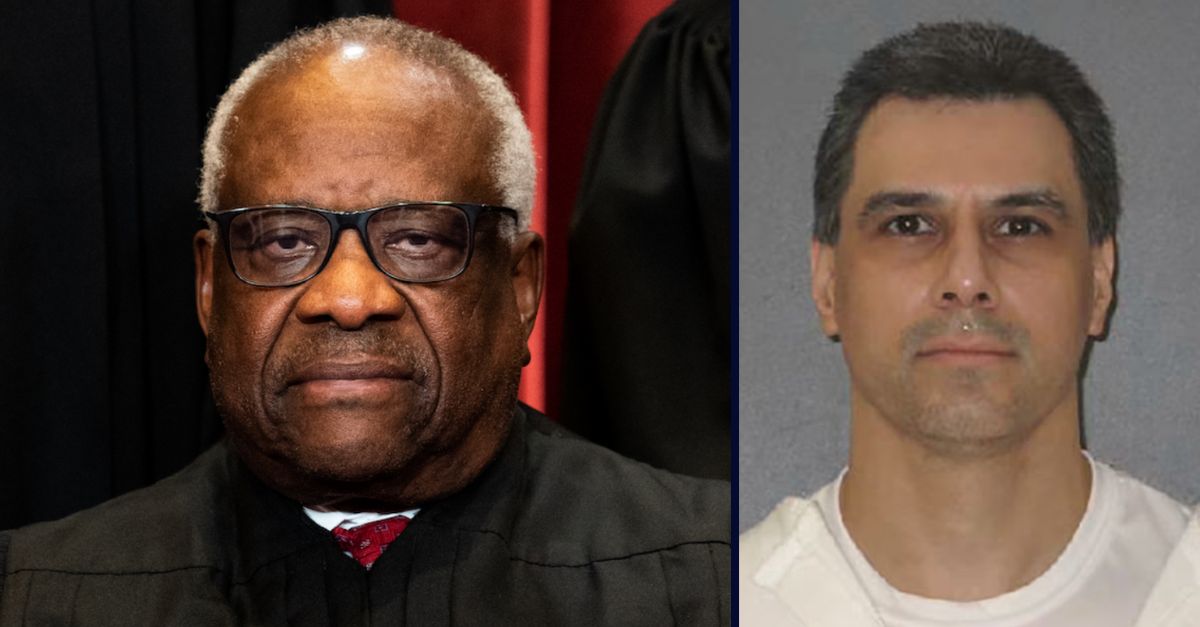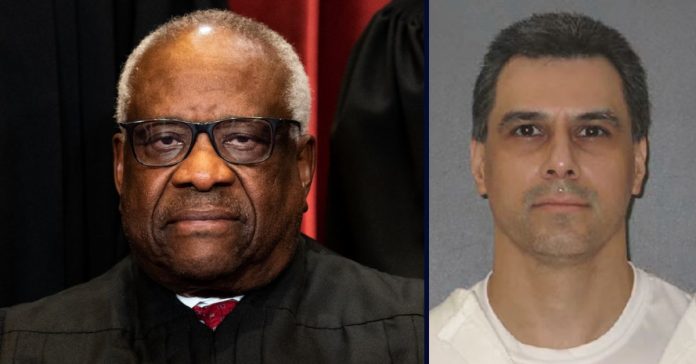
Left: Associate Justice Clarence Thomas sits during a group photo of the Justices at the Supreme Court in Washington, D.C., on April 23, 2021 (Photo by Erin Schaff/Pool/Getty Images). Right: Ruben Gutierrez (Texas Department of Criminal Justice).
A death row inmate who narrowly avoided execution in 2020 and 2024 and claims he did not murder an 85-year-old woman more than two decades ago in Texas will be allowed to sue a local district attorney who refuses to conduct DNA testing of evidence from the crime scene, the U.S. Supreme Court ruled on Thursday.
The majority led by Justice Sonia Sotomayor — joined by Chief Justice Roberts, Justice Elena Kagan, Justice Brett Kavanaugh, Justice Ketanji Brown Jackson, and partly joined by Justice Amy Coney Barrett — decided that Ruben Gutierrez does have standing to sue Cameron County District Attorney Luis Saenz for civil rights deprivations under 42 U.S. Code § 1983 — a federal civil rights law — in order to challenge the Lone Star state”s “postconviction DNA testing procedures under the Due Process Clause.”
Texas Department of Criminal Justice records show that Gutierrez, now 48, has been on death row since May of 1999, less than year after 85-year-old Escolastica Harrison was brutally murdered during a robbery in her Brownsville home. Harrison, a retired teacher, was stabbed to death with screwdrivers.
After the crime, authorities identified Gutierrez, Rene Garcia, and Pedro Gracia as the suspects; Garcia is serving life in prison and Gracia, the alleged getaway driver, is still at large.
Gutierrez has claimed that although he and two accomplices did plan to rob the victim, he didn’t step foot inside her home and that DNA testing of blood, nail scrapings, and a hair would prove he didn’t kill Harrison. He has also claimed that a signed confession to having been inside the home was “coerced” by police.
Sotomayor, likening the case to that of Rodney Reed, ruled that Gutierrez does have a “liberty interest” and thus has standing to sue over Texas’ Article 64, which lays out how a convict may seek DNA testing, namely: if the “convicted person establishes by a preponderance of the evidence” that he “would not have been convicted if exculpatory results had been obtained through DNA testing” and that the “request for the proposed DNA testing is not made to unreasonably delay the execution of sentence or administration of justice.”
“In the end, Reed is indistinguishable,” Sotomayor concluded. “Gutierrez has standing to challenge Texas’s DNA testing procedures under the Due Process Clause.”
Justice Clarence Thomas penned one of two dissents, also joining Justice Samuel Alito’s separate dissent with Justice Neil Gorsuch.
For Thomas, the Supreme Court had “no business intervening in this case in the first place” and the “intervention serves no purpose other than to exacerbate the already egregious delays endemic to capital litigation.”
The death row inmate has no “liberty interest” under the Constitution in this circumstance, said Thomas, and the Supreme Court distorted the “original meaning” of the Due Process Clause to reach this outcome.
“The Fourteenth Amendment does not protect Gutierrez’s asserted ‘liberty interest.’ As originally understood, ‘liberty’ in the Fourteenth Amendment likely referred only to freedom from physical restraint. It did not include entitlements to government-created benefits,” he said, referring to Article 64. “This Court’s contrary precedent stems from a conscious, policy-based rejection of the Due Process Clause’s original meaning.”
“The Due Process Clause protects an individual’s natural liberty from government interference. It does not guarantee entitlements to government benefits, like Texas’s voluntarily adopted post-conviction procedures,” Thomas expounded later. “By intervening to revive this suit, the Court facilitates precisely the ‘unjustified delay’ that it is supposed to prevent in capital cases.”
Thomas warned that the majority has handed death row inmates “a tool for obstruction” that will only make protracted capital cases drag on even longer.
“By recognizing a ‘liberty interest’ in Texas’s post conviction procedures, however, this Court has converted those procedures from a means of vindicating compelling claims of actual innocence into a tool for obstruction,” he wrote. “In addition to trial, direct appeal, and multiple rounds of collateral review in state and federal court, Texas must now prevail in yet another arena — §1983 litigation challenging its DNA testing procedures — before it can carry out its lawfully imposed sentences.”
The conservative justice further argued that Gutierrez is a case-in-point in how death row inmates can kick the can of execution down the road time and again, noting that the Supreme Court stayed Gutierrez’s execution in 2020 and 2024. The latter stay came down just 20 minutes before Gutierrez was scheduled to be put to death by lethal injection.
“We need look no further than this case. Twenty-six years after the brutal murder of Escolastica Harrison, this Court stayed Gutierrez’s impending execution,” Thomas said, citing the high court’s own 2024 ruling — from which Thomas also dissented — allowing Gutierrez to bring the civil rights claim. “Why? Not because Gutierrez had made a compelling allegation of innocence. Rather, the Court stayed the execution to decide whether Gutierrez has standing to raise a due process challenge to Texas’s post-conviction procedures.”
Thomas clearly did not buy Gutierrez’s innocence case and pointed to the confession that the inmate claimed was coerced.
“There is every reason to think that the ultimate claim of actual innocence on which Gutierrez’s case rests is baseless,” he wrote. “The key premise that Gutierrez hopes that DNA testing will establish — that he was not inside Harrison’s home when she was stabbed to death with a pair of screwdrivers — is contradicted by his own confession, to say nothing of the unanimous statements of his accomplices.”

